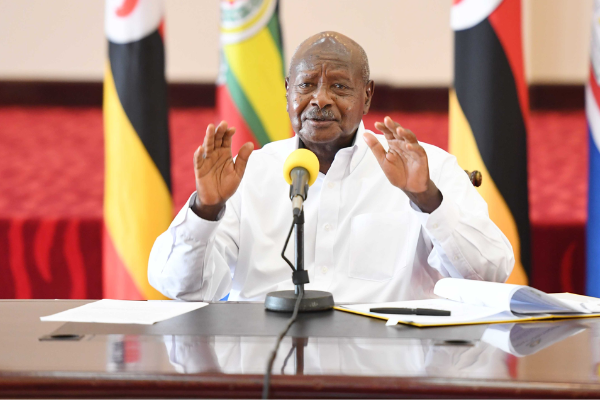
What President Museveni Wants the UK to Learn From Africa
- Category: The Comrade
- Date 14-08-2021
- 961 views
On Thursday 6 May 2010, the United Kingdom held puzzling general elections across 650 constituencies. Puzzling because none of the participating political parties won as none attained the 326 seats needed for an overall majority! It means that the country would neither have a Prime Minister nor a government.
While David Cameron’s Conservative Party won the largest number of votes and parliamentarians, it still fell short of the desired majority by twenty seats, culminating into a hung parliament. The ruling Labour Party had an opportunity to stay in power through a coalition government with the Liberal Democratic Party where the incumbent Gordon Brown would still be Prime Minister. However, Mr Brown suddenly announced his resignation from the job, leaving the opposition’s David Cameron to ascend the coveted office with Liberal Democrat, Nick Clegg, as his deputy.
Mr Brown knew that as the British could not give him and his party a majority vote, they expressed their dissatisfaction with his regime and it was only sensible that he listened to their message and abided by their verdict. This is the decency that we crave for in Africa; when and whether it will ever come, The Comrade knows not!
Uganda’s Museveni laughs at the UK elections
President Yoweri Museveni held a press conference at State House in Entebbe where he expressed shock about the conduct and results of the elections in the United Kingdom. He wondered why any election could not produce a winner, resulting into a Hung Parliament.
“The electoral commission in the UK is very inefficient,” Museveni carped. However, “we do not go lecturing people and issuing reports on that. In the UK, people are rioting on the streets; no one has won,” he said.
President Museveni’s attack originated from recent reports that the United Kingdom and the United States were critical of the electoral system in Uganda where the president tends to manipulate processes with corruption and intimidation to ensure that he does not lose power.
The US Secretary of State, Hilary Clinton, recently presented a report to Congress noting that as Uganda prepares for general elections due next year, it is clearly far below international election standards. The report indicated that ongoing voter registration was poorly organised; the electoral commission is dependent on the whims of the president; part of the work of the Uganda police is to harass opposition politicians, and radio stations cannot host opposition campaigners without risks of having their licences withdrawn or individual journalists penalised. The opposition has thus been calling for a situation where the country can have free and fair elections, generally acceptable to all political players.
African consultants for the UK polls
When President Museveni poured scorn in the British electoral process, he possibly meant that they should have consulted African leaders about the best way to conduct polls. Go to Kampala, Harare, Nairobi, and Addis Ababa.
In the course of tallying the 2005 general elections in Ethiopia, the Prime Minister declared a state of emergency. He outlawed any public gathering, assumed direct command of the security forces, and replaced the capital city police with federal police and Special Forces drawn from elite army units. The national election board of Ethiopia (NEBE) also decided to stop the vote tallying process, an act which was not rescinded for nearly a week. At the end of the day, more than 60,000 people were arrested, about 200 killed in the ensuing chaos, and almost 800 injured. Yes, the Prime Minister had to stay in office.
In 2006, Uganda’s leading opposition candidate Dr Kizza Besigye enjoyed soaring popularity. He returned from exile as the electoral commission had just started registering new voters, and registration centres, which were literally abandoned suddenly, came to life with queues of excited punters most of whom appeared buoyed by Dr Besigye’s return. As more and more turned up for registration, the exercise was quickly stopped in spite of widespread protests. To curb this growing support for the political opponent, Dr Besigye was arrested, charged with rape and kept in prison for almost the entire campaign period. Yes, the President had to stay in power.
The most recent elections in Kenya and Zimbabwe produced identical results: the incumbents clearly lost the polls but only allowed the winners to play second fiddle as Prime Ministers. All the above are African tricks that Europeans are ignorant of. That is why President Museveni doubted the electoral processes of the UK. His message seems to be, “if there is nothing good to learn from us, simply learn from us what we are best at!”
By Venansio Ahabwe
Source: The Comrade, The Guardian on Sunday
